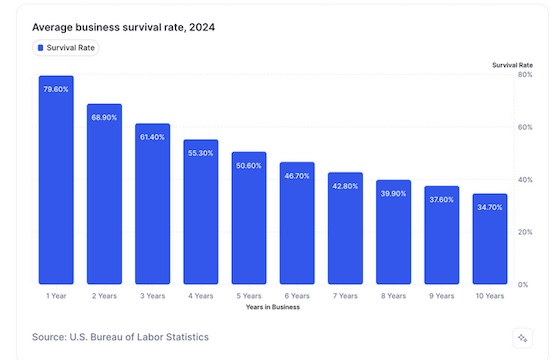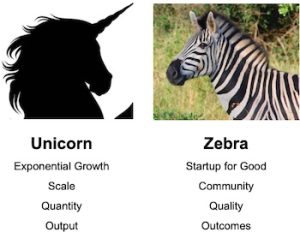Outward Bound to Startup Experience Enlivens Entrepreneurs

Outward Bound to Startup: Outdoor experiential learning and starting a new venture might seem like an oblique connection. The reality, though, is that such learning has many important lessons for the aspiring entrepreneur—or the fledgling business owner. They are not often taught in business incubators or at business school, but more is the pity, especially in the rapidly evolving world of venture creation and the new economy, where people and the planet demand more respect than privilege and profit. Many startups struggle to describe their ‘Purpose’ in ways that are both in valid in day-to-day management and that stand up to scrutiny.
Takety Boots and Haversacks
Takety Boots (hobnail boots) and Haversacks (precursor to rucksacks) were the gear worn for trekking and expeditions back when I was a boy in the 1950s. Trekking in the wild is at the heart of Outward Bound—an outdoor expeditionary educational organization founded over eighty years ago in the UK and now operating in 35 countries round the world (nine are in the US). Its outdoor experiential learning methods are based on the ideas of Kurt Hahn1, who said that “we are all better than we know. If only we can be brought to realize this, we may never again be prepared to settle for anything else”. His conclusions include notions of self-discovery through curiosity and experimentation; success and failure—to build confidence; continuous personal and group learning. Outward Bound’s mission is to change lives through challenge and discovery. The process values collaboration as well as competition in communities where diversity and empathy are valued. The expectation is that success will come through risk-taking and the confrontation of challenges. Respect for other people and the natural world refreshes the human spirit and is likely to encourage reflection, as well as building service and compassion.
Entrepreneurship2 needs many personal characteristics and skills. It is not immediately evident that ‘outward bounding’ would be the way to prepare someone with a new venture in mind. I can speak from personal experience, however3. I first went  to Ullswater Outward Bound in the UK at the age of 15. The learning was immediate upon my arrival, when I found that I was the youngest in my troop and only boy from a boarding high school—the only one without experience of reform school or juvenile incarceration. As a young adult, I joined an expedition to Arctic Finland. Over 50 years later, I experienced sailing off the Atlantic coast from Hurricane Island Outward Bound in Maine, with a eager bunch of similar senior professionals. Though I’d sailed since boyhood, at 69 sleeping on the deck was new to me.
to Ullswater Outward Bound in the UK at the age of 15. The learning was immediate upon my arrival, when I found that I was the youngest in my troop and only boy from a boarding high school—the only one without experience of reform school or juvenile incarceration. As a young adult, I joined an expedition to Arctic Finland. Over 50 years later, I experienced sailing off the Atlantic coast from Hurricane Island Outward Bound in Maine, with a eager bunch of similar senior professionals. Though I’d sailed since boyhood, at 69 sleeping on the deck was new to me.
Outward Bound Learning Applied to Business Startup
Based on my personal experience, here are some of the ways I suggest that Outward Bound learning principles and practice are valuable for those set on an entrepreneurial path; hence Outward Bound to Startup. Those principles are based on a deep appreciation of the balance between risk, reward and responsibility. Right from my British high school (Bryanston), but particularly as I started my entrepreneurial adventures, the deeply embedded experiences offered usable characteristics.
- Self-discovery & Reflection: At Outward Bound, people are in group and solo learning situations, just as they are on their entrepreneurial learning journey. When most people hear the word ‘entrepreneur’, it is likely to conjure up the picture of a profit-driven self-starting go-getter. Images of well-known ones in the news probably spring to mind. Most entrepreneurs don’t fit that image, even if they do start new ventures and go to be successful. Introspection is a very significant attribute for entrepreneurs, especially for blue-sky innovation, creative problem-solving, sustainable strategy development, dealing with new challenges, and other uncharted waters.
- Success/Failure: Startups inevitably experience failures—both small and large; learning from them is often
 the start of something better, rather than going bust. To improve is not simply a matter of applying determination in the face of failure, but rather to use the encounter as a learning opportunity and to analyze it, rather than to abandon ship. On my own entrepreneurial journey I’ve seen new business creators stumble and fall—indeed 20.4 per cent of businesses fail in their first year after opening; 49.4 per cent fail in their first five years; 65.3 per cent fail in their first ten years. The question to confront needs to concern both what happened and why.
the start of something better, rather than going bust. To improve is not simply a matter of applying determination in the face of failure, but rather to use the encounter as a learning opportunity and to analyze it, rather than to abandon ship. On my own entrepreneurial journey I’ve seen new business creators stumble and fall—indeed 20.4 per cent of businesses fail in their first year after opening; 49.4 per cent fail in their first five years; 65.3 per cent fail in their first ten years. The question to confront needs to concern both what happened and why.
- Collaboration/Competition: I remember that when we were starting our main business, a lot of energy went into analyzing our potential competitors. Although we did have a partnership with another firm so, working with them was important. But I don’t seem to remember cogitating much about the balance between collaboration and competition and when either one was appropriate or likely to lead to a beneficial outcome, On the other hand, my Outward Bound training did set me on the journey of competition with myself. In other words using my natural competitiveness to be inner more than outer directed.
- Diversity & Inclusion: My childhood Outward Bound experience demonstrated to me very vividly that people who were outside my experience could be so different and yet at the same time work very productively together. As a troop leader, one of the tasks I was given was to ensure that within the group there was no cigarette smoking (my brief smoking life started much later in the Army). The other boys and I were going to need to work together over the following weeks and I could not behave in an alienating way. Hence naturally, what I discovered was we each had some good and less good traits, but we were interdependent, and needed to be so for if our super-ordinate goals to be personally achieved. Ropes courses and rock climbing were another matter!
- Empathy & Compassion: Empathy is associated with attitude and compassion more with actions. These words are infrequently associated with business. They are fundamental underpinnings of the Outward Bound philosophy. Building empathy and compassion into company culture brings positive benefits to engagement in the workplace and market benefit in brand loyalty. These commercial advantages are measurable, and the cultural and social contributions are self-evident.
- Service to Others: The word ‘interdependence’ is a critical concept for any entrepreneur who proclaims a commitment to all stakeholders, rather than shareholder primacy and the pursuit of wealth. In wilderness training on an Outward Bound course, it’s a concept that may impact life or death. The leadership of a new venture must appreciate the significance of everyone or every group in society with whom the business interacts or upon whom it relies. Ignorance either knowingly or unintentionally, will have a serious negative impact on the prosperity of the enterprise.
It’s interesting to me that more and more startups and small firms specifically recruit for traits like these. When hiring, my healthcare insurance agency, Dublin Health, seeks, among other qualities: empathy, compassion, people-orientation, with a heart of service; people who work collaboratively with a team, and are strongly self-motivated.
Experience Enlivens Entrepreneurs
“Learn for yourself”, Robert Louis Stevenson urged readers Treasure Island—an attitude I manifested long ago and maintain still, in my second childhood. Many people gave me negative advice when I was working on starting a business, but most of them had never dared to take the entrepreneurial path themselves. Experience of expeditionary learning is an investment that pays off handsomely when you take the plunge into business for yourself. It does not mean that there are less stumbles, but the ability to analyze why you fell and reflect on how to avoid repeating the miss-step will enable a positive path thereafter.
Learning for yourself and about yourself is greatly enhanced by the kinds of challenges faced and met in an Outward Bound kind of environment, because you do it yourself, without there being a set formula or set of rules. Indeed business startup does not have a set of rules, despite all the acknowledged tools and techniques that experts may offer you. Hence Outward Bound to Startup is likely to help you meet the challenges of entrepreneurship.
Business plans are a great help to getting your startup ideas sorted out and communicating them with others, like banks and financiers, but the young business never goes exactly according to plan! Startup capital does not always take the form of a great fat check and much of the capital may be in the form of vaporous passion, vision, attitude, creativity, invention…
Unicorns and Zebras
 Exponential growth of profits and valuation might possibly drive a startup to a huge equity valuation and ‘Unicorn’ status—but passion and purpose will more likely lead founders to sustainable prosperity and a ‘Zebra’ nature. While the unicorn will have a billion dollar value, zebra nature will share values. The unicorn will know wealth and dominance, but the zebra will know people and mutuality.
Exponential growth of profits and valuation might possibly drive a startup to a huge equity valuation and ‘Unicorn’ status—but passion and purpose will more likely lead founders to sustainable prosperity and a ‘Zebra’ nature. While the unicorn will have a billion dollar value, zebra nature will share values. The unicorn will know wealth and dominance, but the zebra will know people and mutuality.
The experience of Outward Bound, or expeditionary learning will likely take you places in business that you had not previously envisioned. Remaining open to possibility, the entrepreneurial journey is hard and full of delightfully unexpected rewards, both material and altruistic. However, it’s tough to go the Entrepreneurial Zebra route on the business safari. You might find some encouragement from some of the entrepreneurial Zebra guides out there4.
Prepare Early and Keep Learning for Entrepreneurial Life
There is good reason to prepare early for an entrepreneurial life, given that many of the necessary skills are beneficial in any eventual occupation. For example, Expeditionary Learning (EL) is a movement that was founded in 1991 by Harvard Graduate School of Education and Outward Bound. Aimed at K-12 schools, there are now more than 160 across the US. They feature project-based learning expeditions, where students engage in interdisciplinary, study of compelling topics, in groups and in their community. EL teaches students to be leaders of their own learning. Through compelling topics connected to the Common Core standards, students learn skills and content through real-world projects.
There is no reason to stop expeditionary learning as your entrepreneurial journey unfolds—Outward Bound to  Startup skills don’t stop on Day One. Outward Bound Professional programs across the US offer ways to increase team effectiveness, cultivate a positive and empowering culture, for example. Most of the US Outward Bound Schools offer training for the workplace. They vary in type and can be at locations of the client’s choice, as well as being customized for the particular company or group.
Startup skills don’t stop on Day One. Outward Bound Professional programs across the US offer ways to increase team effectiveness, cultivate a positive and empowering culture, for example. Most of the US Outward Bound Schools offer training for the workplace. They vary in type and can be at locations of the client’s choice, as well as being customized for the particular company or group.
Such benefits are especially rich for any new business that aims to startup for good. A professional program in the wilderness of the Cathleen Stone Island Outward Bound in Boston Harbor is an example of courses for an early stage business team likely to both stimulate creativity in problem-solving and collaboration.
Further Reading on Ways to Enhance Startup for Good Performance
- Practice Makes Purpose
- Entrepreneurial Altruism
- Startup Consciously
- Purpose Driven Startups Challenge Accepted Wisdom
- Startup to Flourish
- Flourish Honorably
- Profits to Purpose
Notes:
- Kurt Hahn founded a school called Salem in Germany in the 1930s, before moving to the UK and founding Gordonstoun School in Scotland and later, Outward Bound. His set of principles to guide education were called the Seven Laws of Salem: 1.Give the children opportunities for self-discovery. 2. Make the children meet with triumph and defeat. 3. Give the children the opportunity of self-effacement in the common cause. 4. Provide periods of silence. 5. Train the imagination. 6. Make games important, but not predominant. 7. Free the sons of the wealthy and powerful from the enervating sense of privilege.
- Entrepreneurship is the subject of much study and advice. My ten cents worth is deeply embedded throughout the Venture Founders website, so a search here will give you many links. You might like to start by looking my Reflections of Entrepreneurship, or simply reading Being an Entrepreneur.
- It’s not just a matter of my personal journey from Outward Bound to Startup, however—here’s another person (of many), who helps entrepreneurs on their way. Dan Sullivan went to Outward Bound in Scotland and later founded an entrepreneur coaching business—here’s what he says: How to Develop an Entrepreneurial Mindset.
- In Pursuit of Impact: Choosing Zebras Over Unicorns; What is a Zebra in Startups? Exploring a Sustainable Alternative; Zebras Fix What Unicorns Break.




